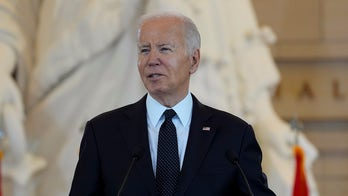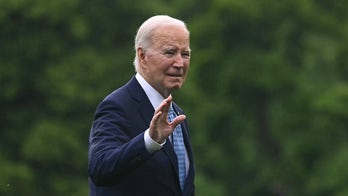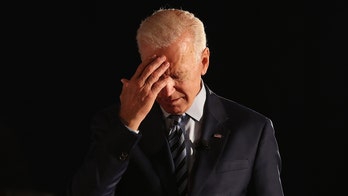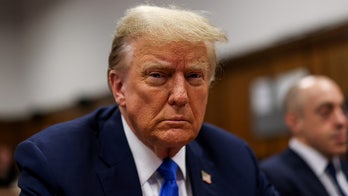Obama Misunderstood Capitalists and Consumers
“The idea that there might be a recession in the next year – I think that has substantial probability”
-- Yale University Economist Robert Shiller talking to the Wall Street Journal about the chances of a dibble-dip recession.
May saw the fastest increase in U.S. consumer prices since 2006. That’s cause for real concern because rising prices can either be a symptom of economic growth or a drag on a weak economy, and this sure ain’t the former.
In 2006, it was inflation. In 2011, it’s stagflation. The Federal Reserve can deal with inflation by reining in growth by increasing interest rates. But stagflation is much harder to cure (ask Gerald Ford and Jimmy Carter).
To defeat the last round, it took a one-two punch of massive tax cuts to stimulate economic growth combined with a drastic decrease in the monetary supply – Ronald Reagan stomping on the gas and then Fed Chairman Paul Volker simultaneously yanking the emergency brake.
Meanwhile, the Greeks are rioting again and the austerity-hobbled government in Athens looks ready to fall. If Greece’s tiny economy finally fizzles it could take the Euro down with it. And with the U.S. government unable to borrow for itself, it can’t help with the latest proposed round of Euro floating.
Developing economies in China, India, Russia and Brazil are starting to show signs of distress as consumer demand slows in the West.
Here at home, housing prices continue to fall, banks are not lending, unemployment is on the rise and consumers aren’t spending.
President Obama is trying to stress that this isn’t part of a trend back into economic contraction – that a spike in gas prices, bad weather and a Japanese tsunami have caused a short-term problem that will soon fade as the underlying recovery takes hold.
But one of the problems with economists is that they have such a hard time predicting human behavior. The Obama economic team proposed a policy slate aimed at restoring growth while alleviating the disparities between the rich and poor and restoring the environment – mandatory health insurance, tax increases, global warming fees, etc.
But that strategy assumed that investors, capitalists and consumers would act in their own short-term financial interests rather than seeking to avoid the parts of the new package they did not like.
While conservatives say that it is regulatory uncertainty that is stifling the economy, it might also be described as political uncertainty. The 2010 elections showed deep vulnerabilities for Obama, leaving very much open the question of whether he will be elected to a second term.
So rather than behaving the way the president’s economists have said they would, the capitalists are hedging their bets until the next election. Washington is gridlocked until then anyway and massive changes will be in store whoever wins – a second Obama term would bring full imposition of many of the controversial policies, while a Republican victory would see a whole new regulatory scheme.
That political uncertainty leaves the economy dangling at a point where natural disasters and Arab rebellions can play havoc.
The president is working hard to convince the Democrats and independents in the capitalist class that he is serious about restoring growth. This is partly an effort to create growth itself and partly a bid to raise the money Obama desperately needs to launch his re-election campaign into these headwinds. Some capitalists want more stimulus spending, others want lower taxes and less regulation. But none of them like the status quo.
But that effort brings its own problems. When Obama hosts big Wall Street donors for a special coffee klatch at the White House or refers to unemployment as a “bump in the road” or cracks wise about the missed expectations of the 2009 stimulus, he opens himself up to criticism that he is out of touch with the concerns of the poor and middle class voters. That’s especially ironic, since it was for them that he arranged the very policies so disliked by the moneyed class.
Republicans are having a blast today celebrating the one-year anniversary of “Recovery Summer,” an administration effort to celebrate the revival of the American economy under the president’s policies. That summer instead saw stagnation and mounting unemployment just as this one is now threatening to bring.
The decision by White House aides to allow a banner reading “Mission Accomplished” to remain in place when George W. Bush went aboard the USS Abraham Lincoln on May 1, 2003 to declare the end of “major combat operations” in Iraq would haunt the president the next year.
It took an extraordinary reelection effort and a weak Democratic nominee to keep Bush in office in part because “Mission Accomplished” served as a easy shorthand for the disappointments of the Iraq war. “Recovery Summer” has many of the same resonances. Certainly Obama’s sinking popularity, even after a lengthy victory lap celebrating the killing of Usama bin Laden, suggests Americans think that Obama really blew it on the economy.
Of course, gleeful Republicans should remember who won the 2004 election.
Unable to Win Support for Libya War, Obama Risks Crisis with Congress
“U.S. forces are playing a constrained and supporting role in a multinational coalition, whose operations are both legitimated by and limited to the terms of a United Nations Security Council Resolution that authorizes the use of force solely to protect civilians and civilian populated areas under attack or threat of attack and to enforce a no-fly zone and an arms embargo.”
-- Obama administration letter to Congress about U.S. involvement in the Libyan civil war dismissing claims that the administration is three days away from being in violation of the president’s military authority.
America’s entry into the Libyan civil war has lasted far longer than President Obama promised. He said the American role would be measured in “days, not weeks,” but the American commitment is now approaching three months in the stalemated civil war.
Costs have piled up faster than expected too. The weakness of America’s NATO allies has shifted more of the burden to U.S. forces. The president’s current commitment, now extended through September, is estimated to cost $1.1 billion.
The final frustration in the war has been the ineffectiveness of the rebel forces. Hawks now lament that Obama dawdled before listening to Hillary Clinton who pushed for intervention. They say that swift action then would have quickly toppled Col. Muammar al-Qaddafi. But the rebel forces – a blend of eastern tribesmen and Islamists – seem to lack the broad support necessary to overcome centuries-old tribal divisions.
Had Obama had known how things would turn out, he might have taken more care to get congressional approval for wading into the war. But he thought Western forces and the rebels would be greeted as liberators. But with NATO unable to prosecute the war without disproportionate assistance for the U.S. and rapidly shrinking support for the conflict at home, Obama is in a box.
If Obama obliges Speaker John Boehner and seeks some kind of congressional authorization for the conflict, the president takes a substantial risk of a bipartisan repudiation. That would mean the U.S. dropping out of Libya, a European war, at a moment when the Euros are trying to drop out of the American war in Afghanistan.
Obama has enough problems in Afghanistan and Pakistan without seeing NATO helpers vamoose. Plus, a falling out now could spell the end of the 60-year-old alliance.
So, Obama has opted to ignore Congress altogether. After much yawping from Congress, the White House has submitted a letter saying that Congress is irrelevant on this matter. The war, the presidents’ men argue, is simply too small to merit congressional approval.
An aide to a moderate Democrat who initially supported the war effort described the administration’s decision to Power Play as “dismissive.” The response from constitutional purists on the right and doves on the left has been considerably less restrained.
But having decided that authorization is now impossible, Obama has opted to instead try to skate past a possible constitutional crisis.
The underlying message in the White House response is that there are no limits on the executive’s military prerogatives as long as the body counts are low and there is an international mandate. That simply infuriates Congress.
Even if Obama could manage to extricate himself from the Libya war before Congress pulls the plug on funding, the president has established newly hostile relations on foreign policy issues.
With Republicans increasingly calling for an end to Obama’s nation-building effort in Afghanistan and Pakistan and Democratic doves feeling deeply betrayed by a man they thought was something of a peace monger, this summer promises to be a very hot one.
Romney Conquering Divided GOP
"The Tea Party took over the Republican Party apparatus in New Hampshire and in South Carolina, so it's really a new wave.”
-- Rep. Michele Bachmann, R-Minn., on “Special Report Online w/Bret Baier”
The top four Republican presidential contenders in the Wall Street Journal/NBC News poll are Mitt Romney (30 percent), Sarah Palin (14 percent), Herman Cain (12 percent) and Texas Gov. Rick Perry (8 percent).
Perry has only just started his presidential flirtations, so Romney may not be too happy to see the Texas governor opening in fourth place on the hit parade, but everything else in the poll is good news for Romney.
Particularly good news for Romney is that after gales of media attention, former Utah Gov. Jon Huntsman came in with 1 percent support. If Huntsman can’t force Romney to defend his left flank in New Hampshire, the former Massachusetts governor will be able to run right in a bid to woo the conservative support that has so long eluded him.
The question for the 70 percent of Republicans not ready to get aboard with Romney, though, is how willing they are to give up on their first choices in order to keep Romney from sailing away with the nomination.
The narrative of the Tea Party movement is that compromise killed the GOP, and that voters want clear conservative consistency. The idea is that long shots empowered with a clear message can defeat the political establishment. And it was true… up to a point.
If the Bachmanniacs and Herminators and Paulistas all stay with their preferred picks, Romney will have little trouble slipping the conservative noose with which John McCain and Mick Huckabee ensnared him in 2008.
And Now, A Word From Charles
“It's revealing that there is a camera there, because otherwise you don't know he said it. What he is saying, look, it's a definition of detached: the way he talks about $1 trillion dollar stimulus -- largest in American history -- which he is admitting he didn't understand. And he was wrong in predicting what it would do to keep us under eight percent unemployment.”
-- Charles Krauthammer on “Special Report with Bret Baier” discussing President Obama’s joke about “shovel-ready projects.”
***Today on “Power Play w/ Chris Stirewalt”: Rep. Shelley Moore Capito, R-W.Va., Democratic Strategist Joe Trippi and former Bush spox Dana Perino. 11:30 AM Eastern at http://live.foxnews.com/ ***




